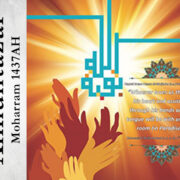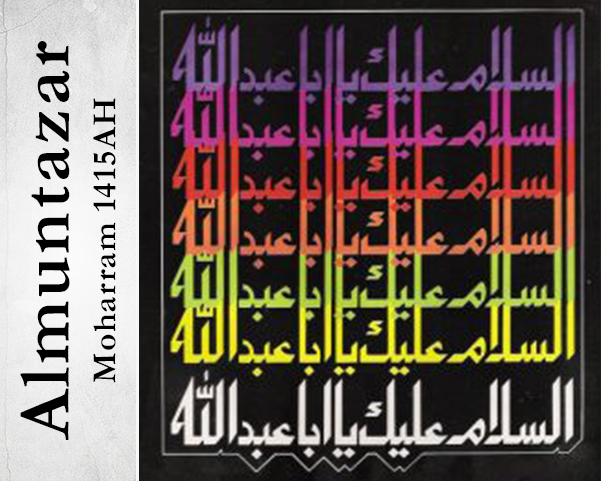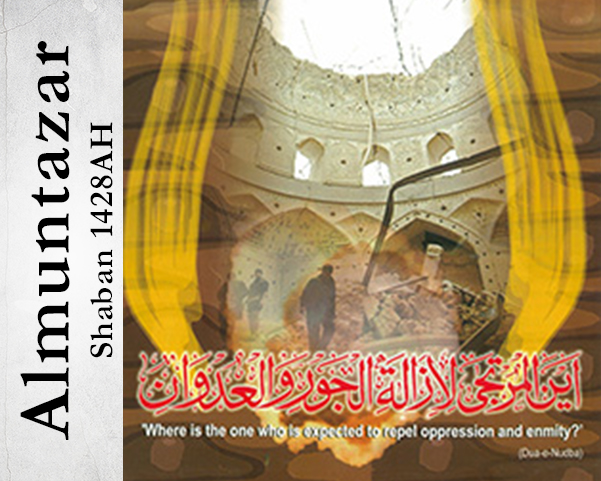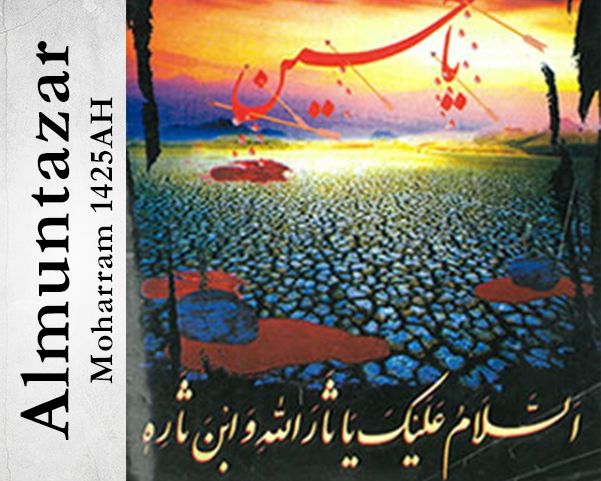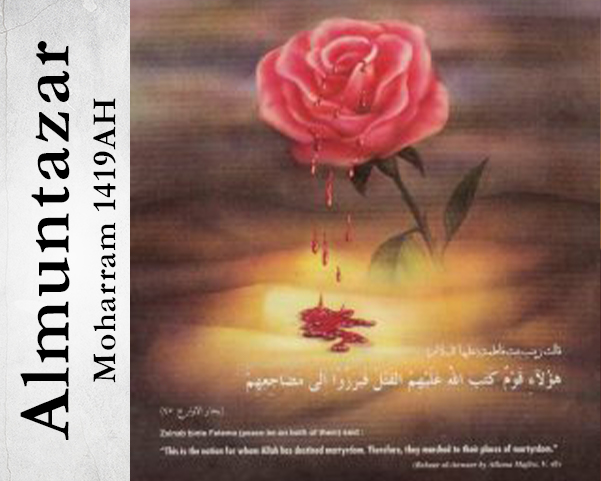Name: Janabe Fatema (s.a.)
Kuniyat: Ummul Hasan, Ummul Husain, Ummul Aimmah and Ummul Mohsin
Title: Zahra, Batool, Siddiqa Kubra, Mubarika, Tahira, and Sayyedatun Nisa.
Father: Messenger of Allah, Hazrat Mohammed Mustafa (s.a.w.a.).
Mother: Queen of Arab, Khadeejatul Kubra (s.a.), the first wife of the Prophet (s.a.w.a.) and the first woman to come under the Faith.
Birth: Born five years after the Declaration of Prophethood in the holy city of Mecca.
Martyrdom: 11th Hijri at Medina Munawwerah, just 75 days, after the demise of the Holy Prophet (s.a..w.a.).
Grave: Due to political expediencies, and as per her own will, she was laid to rest by Hazrat Ali (a.s.) at the dead of the night. To this day, nobody knows where she is actually buried.
Children: Imam Hasan al-Mujtaba (a.s.), Imam Husain Syed-ush-Shohada (a.s.), Janabe Zainab-e-Kubra (s.a.), Janabe Umme Kulsum (s.a.) and Janbe Mohsin, who had met with an untimely and premature end, while completing the course of conception.
Off-spring of the holiest of holies:
Born on Friday, the twentieth of Jamadi-us-Sania, in the house that was the hub of all religious activities, and the destination of Revelation (Message of God). It was in the courtyard of this house, the Prophet of Islam (s.a.w.a.) used to recite and expound the words of God. This shelter for the orphans and a place of peace and tranquility for the oppressed. This was the house of the Prophet of God (s.a.w.a.) the house of the Prophet and last Messenger of Allah (s.a.w.a.) became the nerve centre of universal love and kindness for the whole of mankind for being the embodiment of all the virtues and the highest of values, the Holy Prophet (s.a.w.a.) used to take pride in her, and was more than contented with her. He used to say that she (Fatema (s.a.)) was his soul and that he smells the aroma of heaven in her.
(Kashful Ghummah, vol. 2, pg. 24, Behaar, vol. 3 and Oyoono Akhbaar-ar- Reza, vol. 1 pg. 116).
In short, Hazrat Fatema (s.a.) was the finest example of all that the Prophet of Allah (s.a.w.a.) stood for.
Life with the Prophet (s.a.w.a.):
Janabe Zahra (s.a.) has lived her life in the light of Revelation of God, and under the tender care and guidance of a father, who had instilled sense of decency into all human beings, enabling them to lead a perfect life. When she was only two years old, the infidels of Quraish had imposed a social and economical boycott on the Prophet’s (s.a.w.a.) family. Therefore, she, along with other family members was forced to take refuge at Shaeb-e-Abu Talib, braving all sorts of difficulties like hunger, thirst, etc for a period of three years. When the boycott was finally lifted, she lost her beloved mother, Janab-e-Khadhija (s.a.), and thus was deprived of motherly love and affection. At the age of eight, immediately after the Hijrat (migration), she along with other members of the family left Mecca for Medina . In Medina, she bore and shared all the hardships along with her father (s.a.w.a.). Once, on hearing about the injury sustained by the Prophet of God (s.a.w.a.), she rushed to the battle field at Uhud, to nurse his injuries.
She grew up with the religion of Allah. Islam and Qur’an were part and parcel of her life. Even after marriage her house was adjacent to the house of the Prophet (s.a.w.a.). The Prophet (s.a.w.a.) of Islam used to visit her frequently. Every day before going to mosque for offering the morning prayers, he used to visit her.
(Kashful Ghummah, vol. 12, pg.13).
Her (s.a.) most revered mother:
The early five years of the life of Fatema (s.a.) were spent under the love and care of her most pious mother, Janabe Khadeejatul Kubra (s.a.), who was noted for her high spiritual values and integrity. About her qualities, the Prophet (s.aw.a.) used to say that Khadeeja (s.a.) was the most excellent and exemplary woman amongst all the Faithful.
(Tazkeratul Khawas, Sibte-Ibn Jauzee, pg.302, Printed at Najaf).
There is no dearth of religious narrators, who have mentioned about the high spiritual qualities of the queen of Arab, Janabe Khadeejah (s.a.) very often. Once, when Ayesha remarked, saying that O’ Messenger of Allah! Khadeejah, was an old woman, and that now God has given you a better one.” On hearing this, the Prophet of Islam was displeased and said that God has not given me any better wife than her. Khadeejah (s.a.) has reposed her faith in me when all were professing infidelity. She stood by me when everybody was trying to brand me all that she had, when others were depriving me. Further, God had willed that I should have my progeny by her.
(Tazkeratul Khawas, pg.303).
She died after ten years of the Declaration of Prophethood (Besat). When Hazrat Khadeejah (s.a.) died, it was young Janabe Fatema Zahra (s.a.), who took her place in the performance of all duties.
The exalted Personality of Fatema Zahra (s.a.):
The personality of “The part of the Prophet’s self” that is, the infallible, Janabe Fatema (s.a.) is surely beyond our capacity of comprehension and sensibility and above the range of our grasping power, understanding, and praise. She was infallibility, personified. Our love and esteem for her and her family is an essence, a must for every believer and a duty towards God. She was the lady, whose pleasure and displeasure amounts to the pleasure and
displeasure of God. The full significance of her personality can not be understood by us, earthly creatures. We do not possess the intelligence to characterize her. To put it simply, its impossible. For this reason only, we have to take recourse to convey to our readers, her nobility of soul, her exalted nature, her values and virtues, right, from the source of her progeny:
1. As told by her exalted father (s.a.w.a.) there were only four exalted women in this world, namely, (1) Janabe Mariam (s.a.), daughter of Imran (2) Janabe Khadeeja (s.a.), daughter of Khuwaylid
(3) Janabe Fatema (s.a.), daughter of Mohammed (s.a.w.a..)and
(4) Janabe Aasia (s.a.), daughter of Mazahim (wife of Firaon).
(Manaqib, Behaar).
2. Imam Musa al-Kazim (a.s.), said that once the Holy Prophet (s.a.w.a.) said that God has selected four women only, and they are Mariam, Aasia, Khadeejah and Fatema.
(Behaar and Fazaael-e-Sadoq).
3. Imam Reza (a.s.) quotes that Messenger of Allah (s.a.w.a.) used to say that Hasan (a.s.) and Husain (a.s.) were the most superior men in this world. And their mother was the best of all the women.
(Behaar, Oyoono Akhbaar- al-Reza)
4. Imam Jafar as-Sadiq (a.s.) was once asked, as to why Janabe Fatema (s.a.) was called Zahra? He (a.s.) said that when she used to stand under the arch (Mehraab) for offering prayers, her radiance used to shed light for those high up in the skies in the same manner as the stars shed their light on the earth for the benefit of it’s inhabitants.
(Behaar, Maani-ul-Akhbaar and Elal- ush-Sharaaye)
5. Imam Mohammed Baqir (a.s.) had quoted that once the Messenger of Allah (s.a.w.a.) had sent Janabe Salmaan-e-Farsi (r.a.) on some errand to the house of Fatema (s.a.). On reaching there he stood at the door and saluted (Salaam) her. He then heard that Janabe Fatema (s.a.) was busy reciting Qur’an, and that the grinding stone flour mill was automatically functioning, as if it were being operated by an unseen hand.
(Behaar, Manaaaqib Ibn, Shahre Aashob vol. 3, pg.16)
The Holy Prophet’s (s.a.w.a.) love towards Fatema (s.a.):
It was the unlimited affection and kindness of the Great Messenger of God (s.a.w.a.) that enhances the esteem of the personality of Hazrat Fatema Zahra (s.a.). It was obvious that she did not draw all this attention, regard and affection for just being the daughter of the Prophet (P.B.U.H.), but all this greatness was based on the Qur’anic verse “And he does not speak of his desire. He speaks only what is revealed to him.” (Surah Najm).
Let us, therefore, study some of the sayings of the Prophet (s.a.w.a.) to understand his love and affection for his unparallel daughter:
1. It was customary on the part of the Prophet (s.a.w.a.) that when starting for journey, he would visit Fatema (s.a.) to bid her farewell. On his return, he would pay her a visit immediately.
(Behaar, Kashful Ghumma and Mannaqib Ibn ShahreAashob)
2. The Messenger of Islam (s.a.w.a.), used to say, “Fatema is a part of my body. Whoever pleases her, pleases me and whosoever harms her harms me. To me, Fatema is of the highest value and esteem”
(Kashful Ghummah, vol.2, pg. 24).
3. Aamer Shobi, Hasan Basari, Sufyaan Sauri, Mujahid, Ibn Jubair and Ja’bir Bin Abdullah Ansari all have quoted on the authority of Imam Jafar Sadiq (a.s.) that the Prophet (s.a.w.a.) had said that Fatema (s.a.) was a part of me and whoever displeases her, he has actually displeased me.”
Bukhari, from Masur Bin Mukrami, has also quoted this tradition.
Some moral aspects of Fatema (s.a.)’s life:
1) Piety: Hazrat Imam Jafar (a.s.) and Janab Jaabir Ansari have mentioned this tradition saying that the Messenger of Islam (s.a.w.a) had seen Fatema (s.a) wearing thick and coarse clothes, manually operating a stone grinding mill, and at the same time feeding her child. Seeing this pathetic scene the Prophet (s.a.w.a) broke down. He (s.a.w.a.) then said, that my daughter has to bear these hardships of this world to taste the sweet fruits of the hereafter. She (s.a.) had said, “O Prophet of Allah (s.a.w.a.)! I am thankful to Allah for His bounties.” At that moment a revelation came.
“And soon shall your lord bestow you (with such bounties] then you shall be satisfied.”
2) Household Chores: Imam Jafar Sadiq (a.s.) says that Hazrat Ali (a.s.) used to fetch water and wood for burning. Janabe Fatema (s.a.) used to grind wheat, knead dough and prepare bread. She was extremely beautiful and her sacred cheeks were prettier than any flower. May God bless her, her husband and her sons.
(Rauza-e-Kafi)
Hazrat Ali (a.s.) had said that Janabe Fatema (s.a) used to bring water in large quantities in a water bag. As a result there was a mark on her chest. She also used to operate a stone grinding mill for hours together, due to which her clothes would get soiled by the accumulation of the flour dust. While cooking she would ignite so much fire that her clothes would get dirty. Suffice it is to say, that she has faced numerous hardships in this respect.
(Behaar, Baitul Ahzaan)
3) Janabe Fatema (s.a) never demanded anything from her husband: Once Hazrat Ali (a.s.) asked Janabe Fatema (s.a), “Is there anything to eat?” She replied, “O my honor and by Allah, who had accorded highest priority to your right, that there is nothing at home that could be served, since last three days.” Hearing this Hazrat Ali (a.s.) asked ‘Then why did you not inform me?” Janabe Fatema (s.a.) replied that the Prophet of Allah (s.a.w.a.) had told her strictly not to ask nor demand anything from the son of his uncle. “Whatever he would give you voluntarily, you should accept it without uttering a word.”
(Behaar, vol. 43, p.31, Tafseer-e-Ayaashi, vol. p.171).
4) Mutual understanding in matrimonial life: Ameerul Momineen Ali (a.s.) said, I swear by Allah, as long as Janabe Fatema (s.a) was alive, I have never displeased her nor forced her to do any work. She on her part also did not give me a chance to get annoyed. Whenever, I used, to look towards her, all my worries disappeared.
(Behaar, Kashful Ghumma and Baitul Ahzaan).
5) Veil:
Hazrat Imam Musa (a.s.) says on the authority of his forefathers, that Ameerul Momineen Ali (a.s.) had said that: Once a blind man sought permission to come in the house. She then wrapped around herself a piece of cloth. When the Prophet of Allah (s.a.w.a.) asked her as to why she wrapped herself when the man was blind and that he could not see her, she replied, “Though he cannot see me, but I can see him and that he can smell my fragrance.” Then the Messenger of Allah (s.a.w.a.) proclaimed, “I bear witness, that you are a part of myself.”
(Behaar, A’yaanus Shia)
6) Chastity: Replying to the question as to what is best for a woman, she (s.a.) said that the finest thing for a woman is not to give men an opportunity to see her nor should they themselves look at men.
The Prophet of Islam (s.a.w.a.) asked his companions that when could a woman be in close proximity with Allah? Janabe Fatema (s.a.) replied that a woman is nearest to Allah when she stays at home.
7) Division of duties with the maid-servant of the house: Salmaan Farsi states that once he saw Janabe Fatema (s.a.) grinding on the stone flour mill, while blood was oozing down the length of it’s wooden handle because her hands were bruised. At that time Imam Husain (a.s.), who was a child was crying due to hunger. He then beseeched to Janabe Fatema (s.a.) “O daughter of Allah’s Messenger (s.a.w.a.)! your hands are bruised, let Fizza do the work.” She replied,’ The Holy Prophet (s.a.w.a.) had advised me to share thework between Fizza and myself on alternate days. And yesterday was Fizza’s turn of work.”
(Behaar, Baitul Ahzaan)
Martyrdom:
After the demise of the Holy Prophet (s.a.w.a.), all sorts of hardships that were meted out to Janabe Fatema (s.a.) had shocked her tremendously. On one hand, the effects of separation from her kind and exalted father pained her while on the other, the nefarious and opportunistic activities of unscrupulous persons, who had usurped the rightful caliphate from Hazrat Ali (a.s.) grieved her. Although the painful incident, in which her ribs were broken, had rendered her weak and feeble, yet it was unable to dampen her spirits. In the short span of just 60 to 90 days she faced such hardships that could have melted the heart of a lion. Therefore, she used to address her beloved father, the Holy Prophet (s.a.w.a.), thus: “If these hardships and sorrows that have befallen on me, would have befallen on a bright day, it would have surely turned into a black night.” These were the heart rending feelings of Janabe Siddiqa-e-Tahira (s.a) that were expressed by her without an iota of exaggeration in it. Surely, it was a way of expression.
After the demise of the Holy Prophet (s.a.w.a.), it was customary on the part of Janabe Fatema Zahra (s.a) to weep incessantly. Everyday, she used to go to the grave of the Prophet (s.a.w.a.) and other martyrs. On returning home and remembering the Prophet (s.a.w.a), feeling lonely due to his absence and his actions on the verses of the Qur’an, she would start weeping again. This was her continued expression of protest and resentment against the oppressive regime. It is shocking to mention that even her mourning was being criticized by the people of Medina .
Such was the attitude adopted by those who till yesterday said that if anybody said that the Prophet (s.a.w.a.) had died, he would be beheaded. But today, even the mourning of the daughter of the Prophet (s.a.w.a.) in his memory was an anathema for the so called faithful.
Outside Medina in the graveyard of Baqi, Baitul Ahzaan (The house of grief) was constructed. (It is astonishing to note that within this short period of time, such change in behavior and attitudes could not have taken place, until and unless, it was well calculated thoroughly preplanned).
Janabe Sayyadah (s.a.w.a) along with Imam Hasan (a.s.) and Imam Husain (a.s.) used to go there daily for mourning. At dusk, Hazrat Ali (a.s.) would come there and bring her back home. This incessant mourning and the injury on her ribs started taking its toll and her health began to deteriorate, resulting in her becoming bed-ridden.
Finally while unable to endure hardships, and the excruciating pain of the injury and the shock thereof, she succumbed and breathed her last on 13th Jamadiul Awwal or 3rd Jamadius Sani, just 75 or 95 days after the death of the Prophet (P.B.U.H.). Due to her tragic end, the hearts of all shias were broken forever. O God! for the sake of your chosen maid, and for the sake of her unlimited innocence, we plead You to hasten the Reappearance of Yusuf-e-Zahra, Hazrat Wali-e-Asr, and count us among his helpers, associates and slaves -Aameen.




